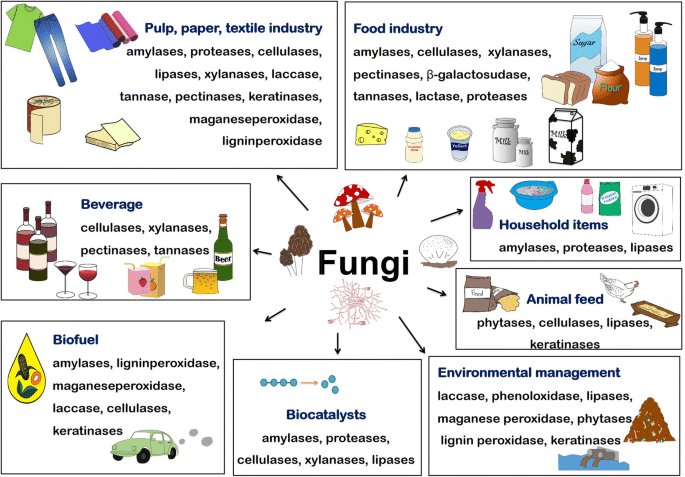Economic importance of fungi
All fungi are either saprophytes or parasites and thus have economic importance that is both beneficial and harmful to food or in agriculture.
Some fungi live at the expense of their living host until the latter dies, and then continue to feed on the dead tissues of the host, which has great economic and ecological impact.
Economic importance of Fungi in Agriculture with Examples
Plant diseases are known as wit, rot, blight, mildew, leaf spot, rust, scab, and smut are caused by fungi.
Rolling of leaves, deformation of fruits, dwarfing of plants, and dropping of flowers and fruits are certain symptoms of fungal diseases that all have economic importance to farmers since their productivity and profits can shrink as a result of fungal diseases.
Some of the examples of economically important plants which are affected by fungi are rice, wheat, barley, maize, rye, potato, cotton, cabbage, grape, and pear.
Most fungal diseases lead either to the destruction of the entire crop or a marked reduction in the quantity of crop yield and the quality of the crop.

How to control Fungal infections on plants
Crop rotation, spraying with fungicides, destruction of all infected plants, and the development of disease-resistant strains of the plant are some methods used for combating fungal diseases in plants.
Economic importance of Fungi in Food with Examples
A large number of plant diseases are caused by fungi. Some of these diseases are of economic importance since the destruction of crops has resulted in a serious shortage of staple food.
An example of the economic importance of fungi in the food industry is the historic potato blight disease which caused such heavy destruction of potatoes in England and Ireland in 1845 that widespread famine resulted in these countries.
The potato blight disease is caused by a species of Phytophthora.
Another example is the rust of the coffee leaf caused by Puccinia swept over Sri Lanka in 1869 and destroyed coffee plantations on the island.
Economic importance of Fungi in Food with Examples
Yeasts are of importance as rich sources of certain vitamins and enzymes.
In the making of bread, yeasts cause the production of carbon dioxide by the fermentation of sugar.
This results in the raising of the dough and is responsible for the porous nature of the loaf of bread.
The fermentation of sugar to alcohol by yeasts, under anaerobic conditions, is the process that is used in breweries.
Beverages like brandy and whisky, which have a high alcoholic content, are produced by fermentation followed by distillation.
Some fungi, for example, truffles, puff-balls, and certain mushrooms are edible and considered delicacies.
Economical importance of Fungi in the industry of Medicines
Fungi cause some superficial skin diseases in men, for example, ringworm and athlete’s foot.
Some fungi also cause serious internal infections in man which can lead to death, for example, a form of meningitis. Some human allergies are also due to fungi.
Fungi can cause the destruction of wooden buildings (dry rot), stored cereals, fruits, and vegetables.
The important role of Fungi
Fungi are also useful to man in many ways. Together with bacteria, they are the important organisms that bring about the decay of organic matter and the formation of humus.
Some fungi are used for producing antibiotics that do not harm man but have an antimicrobial action.
Antibiotics usually act by killing germs or preventing their reproduction.
The presence of some antibiotic-producing fungi in the soil can deter the growth of pathogenic soil organisms.
Antibiotics are also used in the raising of young animals and poultry. they are used to increase the rate of growth, for example, aureomycin increases the growth rate of pigs.
Conclusion for Economic importance of Fungi
Fungi play important roles in soil fertility, and thus have ecological impacts in agriculture and largely in the ecosystem.
They can also affect the productivity and profitability of farmers when their population is not controlled.
Fungi is also very useful to man since some species are consumed by man, others are used in food processing and beverages.
Fungi are also used in medicines to produce antibiotics and other classes of drugs for human health.







